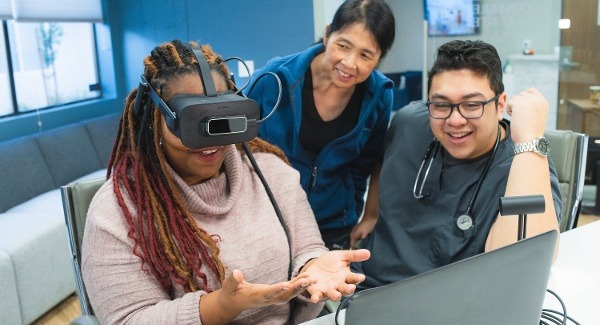Nestled among the many pain points of 2020 were a smattering of bright spots for the seniors housing and care industry. For one, the year ushered in a wave of innovative strategies to combat loneliness in the face of social distancing. Among the top strategies was the use of virtual reality – an area which saw a lot of growth and adoption among operators during the public health emergency. As I delved deeper into researching the topic, I learned that virtual reality – in addition to creating opportunities for socialization and stimulation – has been gaining traction as a staff training tool as well.
Embodied Labs’ person-centered caregiver training, for example, provides immersive learning experiences that mimic many of the common conditions and life transitions that impact people as they age. These lab experiences cover vision and hearing loss, Alzheimer’s Disease, end-of-life conversations, cognitive decline, and LGBT and transgender health and aging. In each of these experiences, the trainee becomes the viewer, and assumes a first-person perspective of how older adults experience different aging challenges.
 In Embodied Labs’ virtual reality platform, proprietary software is combined with a virtual reality-ready gaming laptop and a tethered head-mounted display. The labs have found their place not only for existing caregiver staff to hone their skills, but also for caregivers-to-be. Georgetown University, for example, is now in its third year using the experiences with third-year medical students who choose to participate in a geriatric clerkship. For these medical students, this is a powerful opportunity that really embodies the experience of older patients and is essential practice in being a doctor.
In Embodied Labs’ virtual reality platform, proprietary software is combined with a virtual reality-ready gaming laptop and a tethered head-mounted display. The labs have found their place not only for existing caregiver staff to hone their skills, but also for caregivers-to-be. Georgetown University, for example, is now in its third year using the experiences with third-year medical students who choose to participate in a geriatric clerkship. For these medical students, this is a powerful opportunity that really embodies the experience of older patients and is essential practice in being a doctor.
I spoke with Pamela Saunders, PhD, Associate Professor and Director of the Geriatrics Clerkship as well as Georgetown University’s Aging & Health Master’s program on how the Embodied Labs’ experiences are used to improve care for older adults. Dr. Saunders noted, “The idea really is to promote an understanding of the patient’s perspective for students. Students can read about macular degeneration, but to really experience how difficult it is to see with this disease is what we want them to walk away with.” Along with each experience, medical students do a pre- and post-assessment and share their reflections with their professors. “If I had my way, I’d have every medical student do it,” she continued. “It would be an inexpensive and easy way to provide training to students in geriatric medicine and embody the patients’ perspective.”
The virtual reality experiences aren’t just limited to students. Benedictine Living Community-Winona is an assisted living, memory care, and skilled nursing community serving approximately 200 residents in Winona, Minnesota. On the Winona campus is a CNA Training Center, used not just by Benedictine Living staff, but also nursing students from the three nearby colleges. In 2018, a Bremmer Trust Fund grant provided the training center with eight virtual reality headsets to be used with “The Beatriz Lab”, Embodied Lab’s Alzheimer’s module.
I spoke with Jenna Barkeim, RN/CNA Training Instructor at Benedictine Living about the impact of the CNA Training Center and the new Embodied Lab’s training modules. Jenna recalled working as a CNA on the Memory Care Unit and thinking how hard it is to prepare someone for working in an environment like that. “While staff reactions to the training module varies,” Jenna says, “I feel the experiences are really impactful for everyone, especially those that had or have loved ones with Alzheimer’s. I believe our staff is more understanding and sympathetic after viewing these modules.”
Currently, the CNA Training Center at Benedictine Living Community of Winona utilizes all the modules from Embodied Labs and is currently working to incorporate “The Frank Lab,” which is the recently released training program on social isolation and loneliness. As has been highlighted during the COVID-19 public health emergency of the last year, loneliness and isolation is a national public health problem with a very real impact to an individual’s health and well-being.
When it comes to training the caregivers of America’s older adults, there needs to be more than just reading and listening. Virtual reality training experiences, which are now more portable and affordable than ever, give students and trainees an incredibly immersive experience, allowing them to understand various conditions more fully from a first-person perspective. This ultimately produces a more empathetic and compassionate caregiver, which benefits everyone involved.
About Ryan Brooks
Senior Principal Ryan Brooks works with the research team in providing research, analysis, and contributions in the areas of healthcare collaboration and partnerships, telemedicine implementation, EHR optimization, and value-based care transition. Prior to joining NIC, he served as Clinical Administrator for multiple service lines within the Johns Hopkins Health System, where he focused on patient throughput strategies, regulatory compliance, and lean deployment throughout the organization. Brooks received his Bachelor’s in Health Services Administration from James Madison University and his Master’s in Business Administration from the University of Maryland.
Connect with Ryan Brooks
Read More by Ryan Brooks